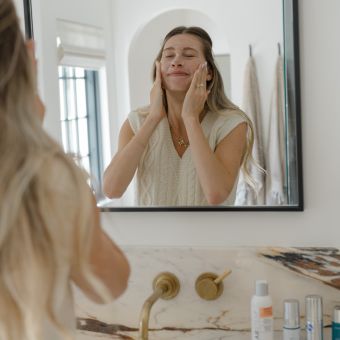posted on: September 23, 2025
Sponsored by Pomp
There’s a special kind of trust that forms when a client lets you care for their skin—and maintaining that trust doesn’t end when they leave your treatment room. In fact, some of the most meaningful results (and strongest client relationships) are built in the weeks between appointments, through the consistency of at-home care.
As an esthetician, recommending home care isn’t about upselling—it’s about creating a long-term care plan that supports your client’s skin health and deepens your role as their go-to expert. When you approach product recommendations with the same care and professionalism as you do your treatments, clients notice—and results follow.
The Shift from Selling to Supporting
Many estheticians feel hesitant to recommend products, worrying they’ll sound too salesy. But the truth is: clients want guidance. They’re already seeing products on TikTok, ads on Instagram, and advice from influencers who don’t know their skin.
What they need is someone they trust to cut through the clutter and give them a personalized plan. Your recommendation isn’t a pitch—it’s an extension of the work you’re doing in the treatment room.
Here’s how to make that shift: 
- Focus on education. Explain what each product does, why you chose it, and how it fits into their overall skin goals. A client who understands why they’re using something is much more likely to stick with it.
- Simplify the routine. You don’t need to recommend a 10-step regimen. Start with two or three essentials that deliver visible results, then build from there.
- Listen to their old routine. If this client only uses soap and water, don’t overwhelm them—start with one product. If they have, for example, an eight-step routine, that shows that they are invested and you can offer a more in-depth routine. Make sure your recs work with their lifestyle!
- Position it as a continuation of care. You’re not just giving them products—you’re giving them the tools to protect and extend their results between visits.
Why Clients Should Purchase From You
It’s easy for clients to click “buy now” from a random online seller, but it’s not always in their best interest—and it’s OK to explain that.
When clients purchase through you:
- They support your small business. Many clients want to back the professionals they trust—sometimes they just need a reminder that this is one way to do it.
- They know the products are legitimate. Unauthorized retailers can sell expired, diluted, or counterfeit products. Buying through you guarantees authenticity and effectiveness.
- They get expert follow-up. When you know what they’re using, you can help troubleshoot issues, adjust their routine, and celebrate results together.
Use Consultations to Customize—and Revisit—Care 
Home care shouldn’t be static. Skin changes with seasons, stress, age, diet and more. That’s why building in regular check-ins is essential. Use consultation time to:
- Revisit their current routine and make updates as needed
- Track progress toward specific goals
- Introduce new products or treatments when they’re ready
This not only keeps clients engaged—it shows you care beyond the transaction. That’s what creates long-term loyalty.
How Tech Can Help You Stay Connected
You don’t have to rely solely on in-person visits to maintain strong client relationships. Simple tools like automated appointment reminders help you stay top of mind and show clients you’re organized and attentive. Social media lets you stay visible and share valuable content—whether it’s before-and-after photos, product spotlights, or skin care tips that build your authority.
With platforms like Pomp, you can take it a step further—clients can shop personalized routines you’ve created for them anytime between visits, whenever they need a refill or feel ready to buy.
The takeaway: Technology doesn’t replace the personal touch—it helps you extend it.
Final Thoughts
Your value as an esthetician goes far beyond the treatment room. When you take the time to educate, guide, and personalize your clients’ home-care routines, you’re not just helping them achieve better skin—you’re building a relationship rooted in trust, results, and care. That’s what keeps clients coming back—not just for products or services, but for you.
Images courtesy Laura Murray, Pomp
- Log in to post comments

